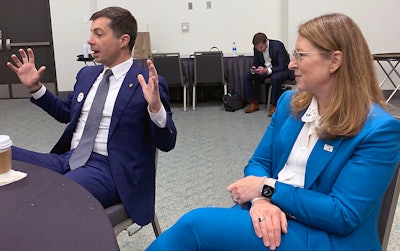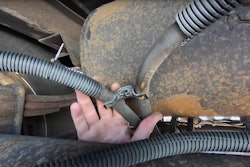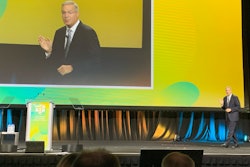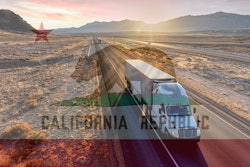
If you were to speak directly to someone who is interested in a career in trucking, what would you say?
This is a career with great earning potential and of great importance to the country and to the economy – one that the country increasingly recognizes as absolutely essential and that can be the basis for supporting a family through an entire working career. But also there are some things that make this a challenging career – that make it tough – and we're very working very hard to address those. If you're entering the career at a time like this, you're entering at a time when my department, and a lot of others, are looking at issues – from the availability of parking to the way people get paid and everything in between – in order to make sure that it's a better career than it's ever been.
How will the Bipartisan Infrastructure Law address the lack of electric vehicle charging infrastructure?
This is one of the reasons why I'm glad that the infrastructure package wasn't one dimensional. You remember all those debates we were having two years ago: Is this infrastructure? Is that infrastructure? And there were some people saying, "Well, if it isn't a road or a bridge, it doesn't count." And we were saying the internet is infrastructure, pipes are infrastructure, and the grid is infrastructure, and they're all connected. So, the fact that we're building out more on the grid side, and obviously that's outside my lane – that's the Department of Energy – but we work very closely with them, of course.
We know that you can't have tomorrow's car and truck fleets running on yesterday's grid. That's why we're upgrading the grid. And it's gonna be challenging, there's no question. I sat down with the truckstop owners and they talked about the issues they're going to have with just a different level of load. But, at the end of the day, pound-for-pound, it can also be a lot more efficient than moving liquids all over the country. It's just a transition like we haven't had to make in really in the whole life of the automotive and trucking sectors, which is why this decade is going be very challenging and full of enormous potential, and there's a lot of business opportunity in that too.
Are the DOT and FMCSA focusing any attention on hydrogen, natural gas, renewable diesel and other means to decarbonize trucking?
The picture for over the road trucking is different than it is for light-duty vehicles and personal cars. What's the same is, obviously, just the imperative in terms of our climate, with not a lot of time and the fact that the choices we make at the policy level can make a difference. So you'll see a lot of our policies are set up in a way that is platform neutral.
On cars, we've placed a pretty big bet on electric, right? But a lot of the regulations you'll see around emissions don't tell you how to get to zero emissions. They just say you've got to get there.
The clean diesel conversation, like the sustainable aviation fuel conversation, is one about how we can bridge to a cleaner place than we've been. If you look at things like some of the incentives in the Inflation Reduction Act, I think they can really help here. So we get that it's not all the same and there's going to be a lot of particular challenges, but also different opportunities around trucking. Especially because, first of all, unlike a car where your second most expensive possession is one you don't use 96% of the time, trucks are designed to be moving all the time, which means when you have a fuel savings, they pay back a lot more quickly. It's definitely true on the electric side if you look at what's beginning to come onto the market, for the kind of smaller middle markets that these EV semis can operate in.
There are also things in terms of the use pattern of how frequently you're going to the same place, or what happens when you're at warehouses, that actually create a lot of opportunity for lower zero emission refueling. We're not naive about the difference between long distance trucking and what's possible even today for privately-owned light-duty passenger vehicles. But, I think the end of the story has to be the same, which is how we had a transformation that created American jobs that got us to a cleaner climate.
How can the DOT and industry can work together to build more resilient supply chains?
I think right now we're processing these lessons in real time, but some things we know are going to be good moves. One is data sharing; just getting a better sense of the data. I think people would assume that a cargo owner has at least as much information about where their cargo is as you'd have for an airline passenger. And it's not actually true. We can do something about that without going after proprietary data. And that's what we're working on with FLOW (Freight Logistics Optimization Works, launched in March, is a first-of-its-kind effort by the Biden-Harris Administration and supply chain companies to develop a digital tool that gives companies information on the condition of a node or region in the supply chain so that goods can be moved more quickly and cheaply, ultimately bringing down costs for families.)
The second thing is looking at inventory and labor models that are so down to the minute; so just in time; so close to the edge, that there's no room for dealing with surprises, especially when you have a welcome surprise of a lot of demand. And I think that has hit every sector in transportation in a somewhat comparable way.
Third is figuring out what kind of flexibilities are appropriate. I think we're pretty committed to partnering with industry on waivers and things that could create a little bit of breathing room, but we need to step back and say, "Okay. Is there a more systematic way to think about how we would do that if we were faced with these circumstances again?" There's definitely a lot of lessons to be learned. I think we're still in the middle of learning.
What is the DOT doing about double brokering where duly authorized and insured/bonded carriers and brokers are involved?
The environment that we're in, especially what it did to spot rates, creates all kinds of opportunities for abuse and I think we've seen that in every sector that touches shipping; that it just becomes that much anytime you have a shortage of availability and anytime you have stupendous profitability on certain routes or certain situations, you see some unsavory actors start to look at how they can take advantage of that.
FMCSA Administrator Robin Hutcheson
We believe in broker transparency. We have an active petition right now. You probably well know that, but I would say keep your eyes open in the early part of 2023 for some additional information... (but in the meantime) we would like to hear from you if that's happening to you.
Does the administration have any plans for reducing detention time at shipper facilities?
I'm pretty fired up about this because here you have a situation where we don't have as many driver hours available as we need in the economy, and simultaneously we're wasting drivers' time.
The first thing that we're doing that I think can help us get after this is the compensation study. Because, of course, part of this is just a consequence of the compensation model that exists (in trucking), which is when you're paid by the load or you're paid by the mile and you're not paid by the hour, nobody is responsible. Nobody is financially responsible for wasting a drivers' time other than the driver. Now, obviously, you have some highroad employers who absorb some of that, but that's not a good answer economically either in terms of the system as a whole. There should be enough economic incentive for detention not to happen in the first place, which brings me the second piece: working with the ports and engaging them.
We have a more energetic FMC (Federal Maritime Commission) and a more empowered FMC, thanks to the Ocean Shipping Reform Act, than we've had, I think, in a long time, and I'm looking to them to help here too. Going beyond just the kind of hard enforcement side; wanting to engage with the port. Not all ports are alike and not all warehouse operations alike. Some are doing better than others. Figuring out the best practices and what we can do to help spread them with carrots and sticks, I think, is gonna be important. But the bottom line is we can't go on like this where we don't have enough capacity on the trucking side, and simultaneously some of that precious capacity is sitting there waiting for a load, waiting for a ticket (or) waiting for a chance to turn around and do their job.










